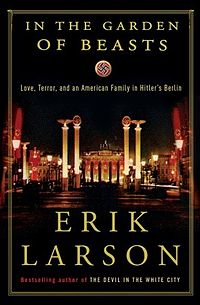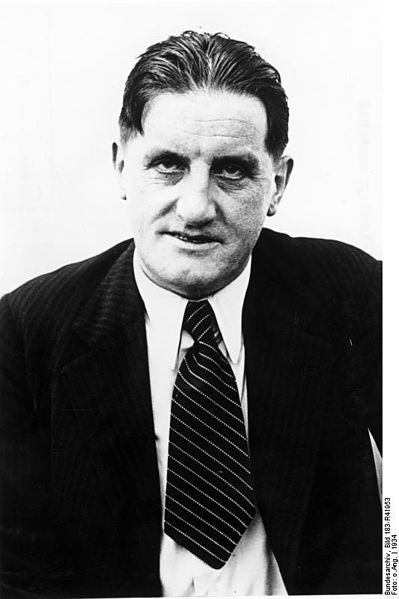
I just finished reading Erik Larson’s In the Garden of Beasts, the story of William E. Dodd’s stint as U.S. Ambassador to Germany during the rise of Hitler (1933-1937).
It’s a compelling tale, involving the internal workings of the state department and the many missed opportunities to head off Nazism, with deft characterizations of the players in the unfolding global tragedy; here’s the New York Times review. Although not as graphically violent as I feared it might be from the harrowing opening scene, the subject matter was inherently disturbing, given my family’s Holocaust background. But not all of the memories it spurred were unpleasant.

Terms of Endearment
When we are introduced to Ernst Hanfstaengl, a large, bear-like German who is part of the rich social scene with which the Dodds’ daughter, Martha, is initially involved, he tells his new acquaintances, “Call me ‘Putzi.'”
Somehow, I’d forgotten: My mother used to call me “putzi” — the equivalent of “sweetie” — too. She didn’t use the term often; both my parents generally avoided speaking German to the children. Maybe it was reserved for when I really needed comforting — or when she did, for those times when only the endearments of her childhood would do.
When you think about it, it’s a little weird for a large, bear-like man to insist that people call him Sweetie. But Putzi Hanfstaengl — Hitler’s piano player and his leading international propagandist — was a bit of a buffoon.
A Genealogical Dilemma
My linguistic link, such as it is, to Hanfstaengl made me curious about him. An internet search led me to something far more interesting than just the details of his life, a piece in Boston Magazine by a distant cousin, John Sedgwick. “The Harvard Nazi” begins this way:
Many amateur genealogists delve into the family archives in search of heroic ancestors — royalty, most commonly — to make them feel better about themselves. What if, instead, they turn up a villain, and not just some charming rogue, but a committed Nazi who was instrumental in bringing Adolf Hitler to power? How should they feel then?
Sedgwick then goes on to talk about Hanfstaengl’s life at length, concluding:
So he was a Nazi to the end. What does that make me? No Nazi, certainly. Nor a sympathizer. But it does reduce the degrees of separation between Hitler and me. A humbling reminder, I think, about evil — that there is no clear line of demarcation around it but merely gradations of complicity. I remain at a safe remove, but I can’t say I am entirely in the clear. Adolph Hitler was, after all, a friend of the family.
Villany or Victimhood?
This made me wonder. Would I want to change places with Sedgwick, to be related to a perpetrator of evil rather than to his or her victims?
Hell yes.

One of the things I disliked so much about Steven Spielberg’s hugely acclaimed Schindler’s List was the way it reduced all the Jewish characters to victims. Schindler was interesting, of course, but so was Amon Goeth, the Nazi guard with the Jewish mistress. In contrast, the Jews, including the character played by Ben Kingsley (see, I can’t even remember his name although that of the Nazi popped into my mind instantly), were all eminently forgettable. At the end of the film it is Schindler who has to remind the concentration camp inmates that it’s a Jewish holiday and that they might, you know, want to pray.
So John Sedwick writes a long and very colorful portrait of his relative, about whom a great deal is known, while I struggle to reconstruct the lives of my family members, who might — or might not — have been interesting too, had their lives not been interrupted. If Freud, say, had not been 82 and at the end of a long career when the Anschluss hit, there might have been a lot less written about him, too.
Would I want to be complicit in acts of evil rather than being victimized by them? That’s a more complex question, one that demands parsing such issues as “How complicit?” and “Did you live to repent and do more good than harm in the long run?”
But in the case of a distant relative, as Sedgwick points out — a bit too glibly — one doesn’t really bear responsibility. And even if I did feel more responsible than I should for an evil family member, I already have guilt in vast quantities. A little more would be a drop in the bucket.
Still, you don’t get to choose. My lot has been cast with the victims. And I concede that, while it’s more difficult, it’s also more rewarding to bring to life those who didn’t survive the Holocaust and those who were deeply affected by it — including my mother, who called me putzi, too.

I went with a friend to see Polanski’s movie The Pianist about the Warsaw ghetto and survival of one pianist. At the end of the movie she expressed the most sympathy for the German officer who ended up in a Russian detention camp. Aside from recognizing that I could not continue our friendship, it has bothered me to no end that the movie perhaps had the same effect on me, although clearly as a second-generation American survivor, more ambivalently .
Your discussion here of Shindler’s List elucidates the issue well. An important and far-reaching one. I have been reading up on Nazi filmography, and this brings up something I hadn’t made a connection to before. Thank you.
Thank you, Diane, for your interest. I think you can blame these Jewish filmmakers for their ambivalence, for making the Nazis more interesting. Why is another question — although I guess it’s historical accuracy in one sense. And maybe what Tolstoi said about happy families applies to victims, too.
It’s funny, I wrote a piece about the problems I had with Schindler’s List for the Arizona Daily Star when the film first came out, explaining my negative reaction. Boy, did I get a lot of flak for it!
p.s. – my Jewish ancestors left Poland in the 1890’s but the relatives who remained were rounded up by the Nazis in 1939 and died in concentration camps – something I only recently learned – so I don’t know if that makes me a “second-generation survivor” of the Holocaust or what the proper terminology is –
The hierarchy of suffering is nutty but it’s real. I experienced it as part of a children of survivors of the Holocaust group. Because my parents weren’t in camps — “only” my grandparents — I felt like I was less deserving of sympathy somehow. So I hear you. I don’t think there’s a proper terminology. And isn’t it crazy to just learn about that!
You raise a probing question, Edie. My immediate response to your question was “perp rather than victim; victim rather than average forgettable person”. But just today, my niece revealed that she’d been researching our family tree and came up with the following about my grandfather to the sixth degree: “Nathaniel Beasley was born 19 May 1774 in Virginia…. He and his brother Benjamin became noted Indian fighters and served with the Virginia Militia in the western territories of Virginia. The two became a perfect team of scouts, serving along the Ohio River scouting Indians for the protection of settlers in the Kentucky region.” She thought this was dandy news. I thought, maybe better to be a descendant of the victims, rather than of those who stole land and slaughtered natives. Or, since the victims may not have had descendants, given the success of my ancestors, perhaps better to be a descendant of an average nobody. In theory.
Interesting. And you’re right — it’s very theoretical. Human nature being what it is, we all probably want what we don’t have, whether it’s possessions or anonymous/victimized/perpetrator ancestors. And speaking of theoretical, my heart stopped for a minute when you said “my niece revealed…” So in spite of my contention — or, rather, John Sedgwick’s — that there would be no culpability when it comes to distant relatives, I realized I would not be happy if any of my close friends had a Nazi ancestor. It doesn’t bother me that you have an Indian scout relative. What does that say about me!?
Our own crosses–or swastikas–to bear.
Some of my ancestors on my father’s side were Armstrongs, “a numerous and turbulent clan,” according to one history of the Scottish/English border. They were, by most accounts, a bunch of murderous ruffians, although they mainly limited their depredations to the English and English sympathizers. One of my uncles ferreted this all out and recorded it for the family, quite proudly, it seems to me. Admittedly, those turbulent Armstrongs were a lot farther back than Hitler, but I feel no particular connection to them, no guilt for what they did to their victims, and no shame, outrage, humiliation, or wounded tribal pride that one of their leaders, along with a mob of his followers, was hanged by an English king. All I feel is a kind of bemusement at the realization that I share their DNA, and that I’d probably be a brutal thug myself if I’d been raised in their circumstances. And I suppose I would have been a brutal thug to avoid being victimized by brutal thugs – or that’s how I would have seen it.
I seem to recall the story of one of your relatives being hanged — for some reason the name Captain Jack comes to mind. This suggests that, whether or not you feel guilty about them, your ancestors were sufficiently interesting for you to tell their story and for me to remember it, lo these many years later — more proof that villains are more colorful than victims!
Correction: The relative who got hanged was “Johnnie Armstrong, and there’s even a well known ballad about him, recounting his rather foolish, and fatal, trip to London at the invitation of the king. He may have been colorful, but he wasn’t very bright.”
Great post, Edie. This really got me thinking, and reviewing ancestors to look for dubious ethics and behavior. I’ve found nothing of that sort so far–they were settlers in New England and then points west and more interested in altering clothes (in one instance) and grafting fruit trees ( in another) than pursuing Indians. But one ancestor was accused (and convicted) of witchcraft at Salem and hanged! I wonder what effect that had on the descendants, and for how long?
Well, now it seems I have TWO friends with ancestors who were hanged, Charlie (who commented yesterday) and you. Fascinating. When you think about it, your ancestor had a unique combination of attributes — she was both a perpetrator of evil (at least in the eyes of others) and a victim, now vindicated by history. That might be the best of both worlds, ancestor-wise!
Thank you for this excellent, personal and thought-provoking review of a book I found fascinating. If you haven’t already seen it, you might find the movie (available on Netflix) “Inheritance” of interest. It is about the woman who discovers belatedly that she is Amon Goeth’s daughter and about her meeting with the woman who was Goeth’s maid/slave in the camp.
Thank you for coming by, Anna, and for your nice words. I appreciate your recommendation too. I have not seen or heard of “Inheritance” but it sounds fascinating. I just tried to sign up for Netflix the other day without success, as it happens. This inspires me to try again.
Greetings to any relatives who are reading this. I’m a Kornmehl descendant via Gutmann Sommer, who is on the family tree.
With regards to this thread, another film on the same subject that I just read about, but have not seen, is Hitler’s Children, just reviewed in the NY Times.
http://movies.nytimes.com/2012/11/16/movies/hitlers-children-a-documentary-about-guilt-by-blood.html?ref=movies&_r=0
So very nice to meet you, Henry! Thank you for coming by and thank you for the link to the film review; I will definitely go to see it.
I am at a conference and traveling right now but will look you up on the family tree and will be in touch.
Edie,
You are always stimulating your readers with interesting and thought provoking topics. I also recommend seeing the PBS movie Inheritance. Our family’s experience with the evil father of the main character is chilling enough. I cannot imagine having him in my family tree. Luckily I have wonderful new relatives like Edie and Henry instead.
Thanks for the nice words, Jill. I will definitely rent Inheritance. And as you’ll see in my next post, you have inspired me to write on some cheerier topics…